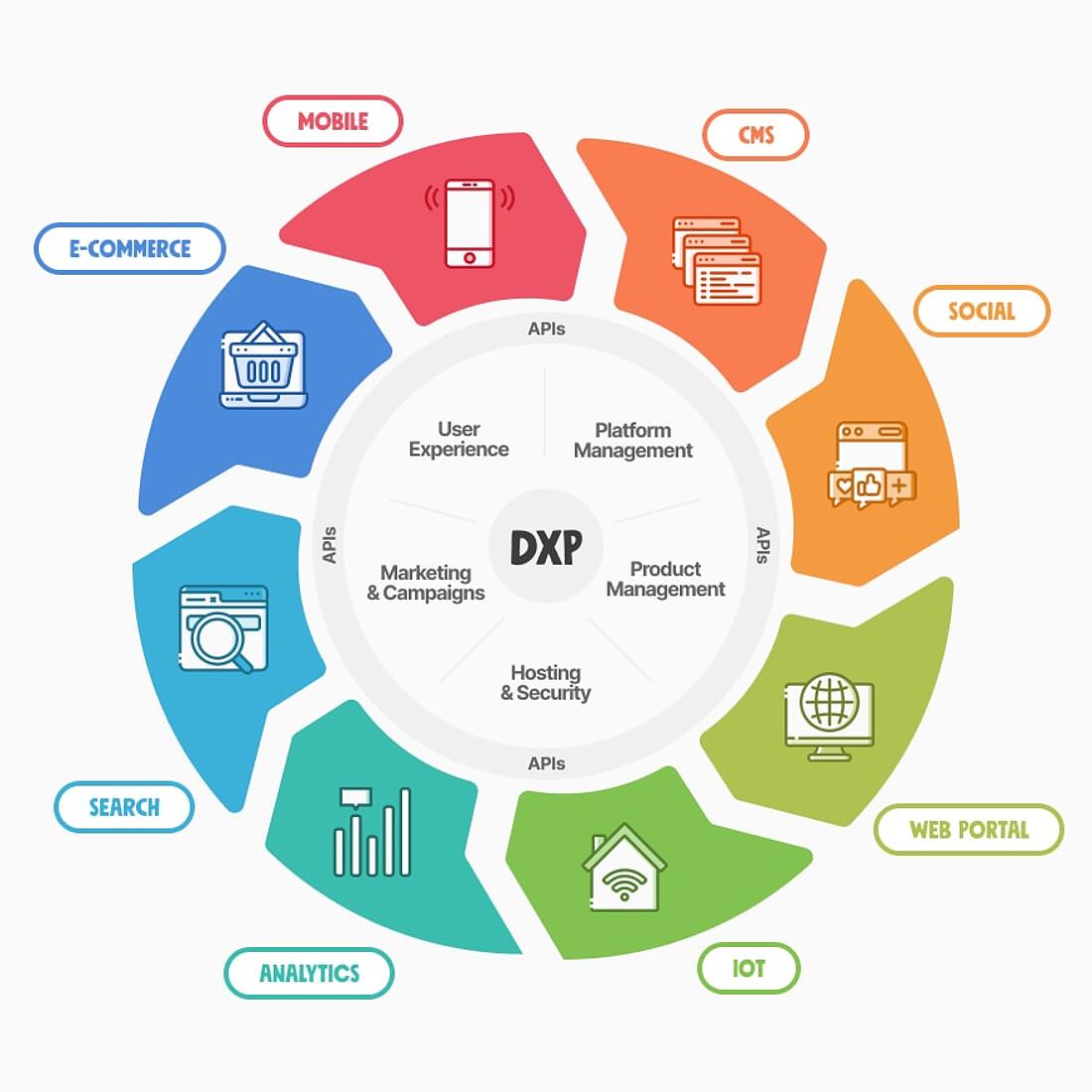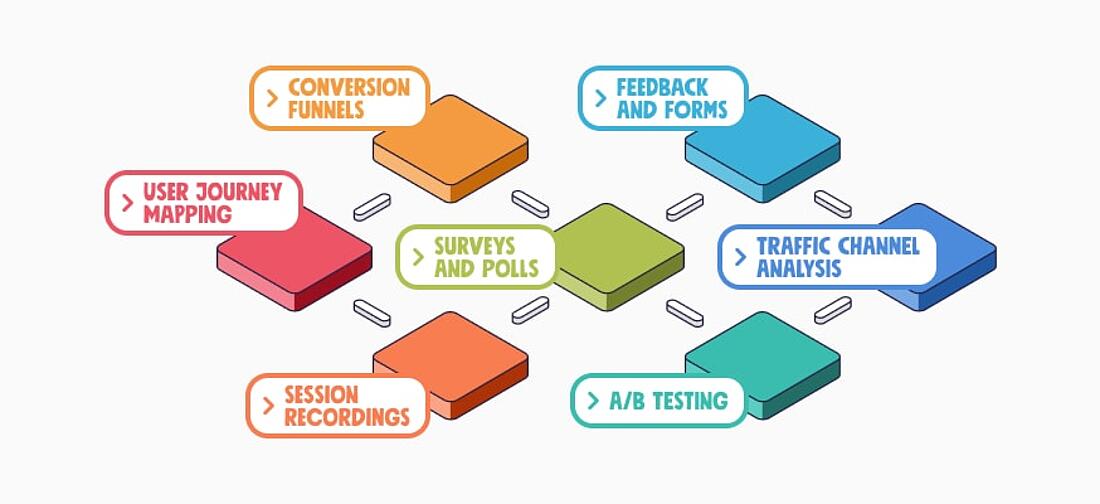- Why Us?
- Features
White Label
For SaaS Platforms & Agencies
Provide our complete analytics suite to your clients, directly within your own interface and with your/their own branding. Discover Analytics-as-a-Service and White Label Analytics. Great benefit, minimal effort.
- Pricing
- White Label
- Success Stories
- ResourcesGetting Started
CONTENTS
- What is Digital Experience Analytics?
- Benefits of Digital Experience Analytics
- Key Methods for Digital Experience Analytics
- Who uses DXA?
- How Can Businesses Analyze Digital Experience?
- Challenges of Digital Experience Analytics
- FAQs
- What Is Meant by Digital Experiences?
- What Is the Difference Between UX and Digital Experience?
- What Is Digital Experience Analytics?
- What Is a Digital Experience Analytics Platform?
What Is Digital Experience Analytics? A Complete A-Z Guide

Did you know that around 67% of internet users abandon purchases or platforms because they didn’t enjoy the user experience?
This striking statistic underscores the critical importance of customer satisfaction in the digital marketplace and emphasizes the value businesses should place on digital experience analytics.
In this blog, you’ll learn about this “user happiness meter”, and the different UX features that businesses should look for when choosing a digital experience analytics tool if they’re to make their customers journeys as enjoyable as possible.
What is Digital Experience Analytics?
→ The “User Happiness Meter”

Digital experience analytics (DXA) is the work that businesses do to understand how internet users interact with their digital properties.
These include websites, mobile apps, social media, and email.
It’s also the term for the digital experience platforms that businesses can use for this work.
Admittedly, that definition makes it sounds exactly like website analytics.
But that’s because modern website analytics has outgrown its own definition, with digital experience analytics being a far better description of what modern iterations of these platforms now do.
Traditionally, website analytics platforms provided basic data on things like page views, visitor numbers, and time on page.
However, these statistics aren’t enough to fully explain how easily visitors find information, navigate a site, or use a mobile app.
This is where digital customer experience analytics comes in.
Simply put, a customer's interactions with a brand no longer starts and finishes in a single website browsing session - if it ever did.
Instead, they might:
→ Scroll past a post on Facebook.
→ Afterwards, briefly visit the company's website.
→ Later, see an ad on X of one of the products they viewed.
→ And, receive an automated email if they subscribed to the site.
Taken together, these elements all form part of their digital experience and businesses need powerful analytics to analyze these all simultaneously.
Given the power of DXA to analyze all these stops on the journey:
Think of this tech as website analytics ++
It allows businesses to analyze all the ebbs and flows of the customer journey across all touchpoints, and to use these insights to make the user experience more enjoyable.
And if you want, you can even see it as the “user happiness meter”.
Benefits of Digital Experience Analytics
Digital experience optimization is primarily aimed at improving customer satisfaction.
But beyond this, it offers several other compelling advantages for businesses.
For starters, enhancing customer experiences significantly boosts revenue.
Positive interactions often lead to increased purchases.
When customers find value and satisfaction in their experiences, they are more likely to convert.
Additionally, greater personalization fosters improved customer loyalty and retention.
Tailoring experiences to individual preferences makes users feel valued.
This encourages them to:
→ Return and engage more with your brand.
→ Spread positive feedback about your platform to their friends and family.
Lastly, leveraging digital customer experience analytics can enhance your competitive edge in the marketplace.
This is especially true when your pricing is similar to that of competitors.
So taken together, DXA enables you to improve your digital marketing strategies and deepen your understanding of customer behavior.
And by doing so, you'll be able to create more targeted campaigns that resonate with your audience and drive engagement across all channels.
Key Methods for Digital Experience Analytics

Digital experience analytics effectively comes down to seeing all a customer's interactions with a website, app, or other channels through their eyes.
And while we can’t completely get inside their heads just yet, modern software allows us to get remarkably close.
Here are some key methods marketers can use to analyze digital experiences:
User Journey Mapping: This involves creating visual representations of the customer journey, outlining each touchpoint and interaction. By mapping these journeys, businesses can identify pain points, bottlenecks, and opportunities for improvement.
Session Recordings: Utilizing session recording tools allows businesses to watch real-time recordings of user sessions on their websites. This method provides insights into user behavior, such as clicks, scrolls, and navigation paths, helping identify areas for enhancement.
Heatmaps: Heatmaps visually represent user interactions on a webpage, showing where visitors click, scroll, or hover. This data helps businesses understand what content draws attention and what might be overlooked.
Conversion Funnels: Funnels enable businesses to analyze their sales pipelines, and to identify bottlenecks, problem pages, and other issues that are restricting their conversion rates.
Surveys: Directly asking users about their experiences through surveys can provide valuable qualitative insights, helping businesses understand customer opinions and preferences.
Feedback Forms: These forms allow users to share suggestions and report issues, offering businesses direct input on areas that need improvement.
A/B Testing: This method involves comparing two versions of a webpage or feature to determine which performs better. By analyzing user interactions and conversion rates, businesses can make data-driven decisions to optimize the user experience.
Traffic Channel Analysis: This method involves examining the performance of various traffic sources, such as organic search, paid ads, social media, and email campaigns. By understanding which channels drive the most engagement and conversions, businesses can allocate resources effectively and enhance their digital strategy.
Who uses DXA?
Digital experience analytics is essential for a number of industries:
- eCommerce, where satisfied customers are more likely to make repeat purchases and recommend the company to others.
- Digital media, where returning customers foster higher engagement, which is critical for increasing advertising revenue and subscriptions.
- Financial services, where trust and reliability trump everything and satisfaction translates into long-term relationships and opportunities for cross-selling.
- Travel and hospitality, where exceptional digital experiences can lead to higher bookings, positive reviews, and repeat business.
- Healthcare, where understanding patient interactions through online portals, appointment scheduling systems, and telehealth services is crucial for improving patient satisfaction, enhancing engagement, and fostering long-term loyalty.
However, digital experience analytics is crucial for every business.
Today’s internet users have high expectations, and studies show they will abandon a brand if they don’t have a positive experience.
Therefore,
→ marketing teams should leverage DXA to fine-tune their customer experience, and
→ product teams can use this approach to enhance usability.
By harnessing insights from DXA, businesses can create a cohesive strategy that optimizes the entire customer journey, ensuring a seamless and satisfying digital experience across all touchpoints.
How Can Businesses Analyze Digital Experience?
Businesses can begin analyzing and optimizing the digital experience by transitioning from outdated analytics platforms like Google Analytics to advanced website intelligence platforms such as TWIPLA.
TWIPLA offers all the essential data analytics provided by Google Analytics.
But we also offer visitor behavior analytics tools and survey functionality, making the platform an ideal companion for digital customer experience analytics.
Moreover, data protection is a crucial aspect of customer satisfaction.
TWIPLA is cookieless and privacy-first, ensuring compliance with all privacy legislation by default.
This allows businesses to gather the DXA insights they need without collecting personally identifiable information that could put internet users at risk.
However, we’re not the only platform that provides complete web statistics, visitor behavior analytics tools, and communication features.
As such, businesses looking to optimize their customer digital experience can also adopt other platforms that include features across each of these three pillars of website intelligence.
Challenges of Digital Experience Analytics
While digital experience analytics can provide eye-opening insights, it does come with challenges.
Data overload can be overwhelming, as tracking various touchpoints and their intersections means sifting through large volumes of information.
What’s more, balancing privacy concerns with in-depth user analysis is tricky, and especially when meeting compliance regulations like GDPR with cookie-based tracking tools.
Implementing DXA tools can also be resource-intensive, requiring technical expertise to fully integrate and interpret the data. Finally, converting insights into actionable strategies often demands a nuanced understanding of both user behavior and business objectives.
But digital experience analytics platforms like TWIPLA are designed to mitigate these challenges, offering an intuitive interface and privacy-first features that make DXA more manageable and effective for businesses.
FAQs
What Is Meant by Digital Experiences?
Digital experiences encompass how users interact with a brand's online presence across various channels, including websites, mobile apps, social media, and emails. These experiences shape customer perceptions, influencing engagement, satisfaction, and ultimately, their loyalty to the brand.
What Is the Difference Between UX and Digital Experience?
UX (User Experience) focuses on how users interact with specific products or services, while digital experience encompasses the overall journey across multiple digital touchpoints, including websites, apps, and social media, reflecting a broader view of user interactions with a brand.
What Is Digital Experience Analytics?
Digital experience analytics (DXA) is the process of collecting and analyzing data on user interactions with a brand's digital properties. It helps businesses understand user behavior, identify pain points, and optimize customer journeys to enhance overall satisfaction and engagement.
What Is a Digital Experience Analytics Platform?
A digital customer experience analytics platform is a software solution that enables businesses to gather, analyze, and report data related to user interactions across digital channels. These platforms provide insights into customer behavior, helping businesses make informed decisions to improve user experiences.
Share article
Get Started for Free
Gain World-Class Insights & Offer Innovative Privacy & Security








